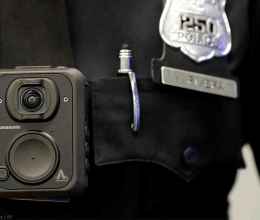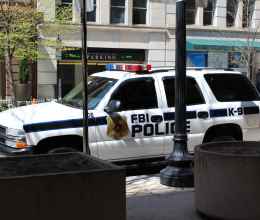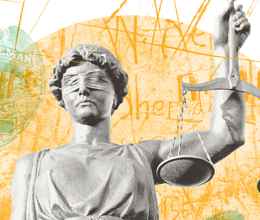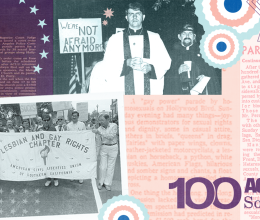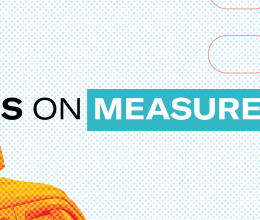
In the early hours of March 3, 1991, George Holliday stepped onto his balcony and saw police begin to beat a motorist on the street below. He then pulled out a video camera and filmed an incident that would become synonymous with police violence and misconduct: the beating of a young African American man named Rodney King by several Los Angeles Police Department (LAPD) officers. News stations across the country broadcast the footage of King lying on the ground as officers viciously kicked and struck him repeatedly with nightsticks.
In revealing the brutality of that one incident, the Rodney King video brought a moment of transparency to policing. The footage showed a version of policing that white, more affluent residents rarely experienced in LA, but that communities of color had endured for decades. The video made it impossible for LA residents – and indeed the rest of the country – to pretend police violence against people of color didn’t happen. And the incident’s aftermath revealed even greater problems: when the officers involved were acquitted by a Simi Valley jury, the public saw that the institutions we rely on to ensure police act within the law and are held accountable when they do not had failed. And when Los Angeles rose up in rage and violence, people saw the depth of anger communities held after years of enduring such injustices.
The past 25 years have seen changes at LAPD and other police departments: increased authority for civilian oversight, occasional discussion of stark racial disparities, the advent of technologies from TASERs to body cameras aimed at making policing safer and more accountable.
But video continues to surface, all too regularly, that reminds us that problems of force and bias in policing have not gone away. Just this week, LAPD revealed use of force statistics showing disproportionate shootings of African Americans, following years of data showing LAPD officers disproportionately stop and search African Americans. The LA Times recently released a report showing that although more than 2,000 people were fatally shot by police in Southern California since 2004, only one officer was criminally charged in connection with a shooting, and he was acquitted. What’s wrong? How could this continue?
Secret By Design
We don’t know — and that’s no accident.
California law makes investigations into peace officers and any resulting discipline strictly confidential, even for police shootings and cases where officers have engaged in serious violations of civilian’s rights. Such secrecy deprives members of the public of their right to know how police use the enormous authority we give them, and how police agencies hold their officers accountable (or fail to do so) for serious uses of force and proven misconduct. California is among the most restrictive states in the nation when it comes to access to officer records — more than twenty-five states have significantly greater access — and the confidentiality extended to peace officer records aren’t given to other kinds of government employees, even though police wield far more power.
This year, the ACLU of California is cosponsoring a bill by Senator Mark Leno, SB 1286, to end the secrecy around these investigations, findings and discipline in cases of serious use of force and proven misconduct, and to ensure the confidentiality for officer records doesn’t create obstacles for effective civilian oversight, including public hearings on misconduct. If knowledge about force and misconduct provides power to hold police accountably, this enormously important bill would shift the balance of power between the people and police.
A One-Sided Tool
With departments across the country putting dash-cams in police cars and body cameras on officers, you might expect that an era of transparency had arrived — that an incident like the beating of Rodney King could never happen today with the public seeing it. But LAPD has enacted policies that make video a one-sided tool for officers, requiring that officers review video to get their stories straight before offering statements in shooting investigations, while insisting that it will never release body cam or dash cam footage to the public without being compelled to do so by a court. Most California departments that have adopted body cameras after LAPD have rejected LAPD’s approach and require officers who are under investigation to give an initial statement before reviewing video. But few departments have policies requiring the release of body camera footage under any circumstances.
Of course, body cameras raise privacy concerns, and police department policies should ensure video remains confidential when officers are called into private homes or need to address sensitive matters, and there’s no allegation of misconduct. But when police agencies refuse to release body camera footage even in critical incidents like officer-involved shootings, they undercut not only transparency cameras are supposed to provide, but also public trust in the department. Body cameras don’t advance transparency when the department works so hard to keep the videos hidden from the public.
LAPD, for example, said that body camera footage exonerated officers in the controversial shooting of Charles Keunang in LA’s Skid Row. But the department has steadfastly refused to release the footage despite public questioning by those who have seen the video that it exonerates the officers as the department says. When such secrecy surrounds video, body cameras create more questions and suspicion than they resolve. LAPD must change its policies to serve transparency or end its body camera program altogether.
People Power
But as the anniversary of Rodney King reminds us, people documented police misconduct before body cameras. Incident after incident, from Rodney King to Eric Garner to Walter Scott to Charlie Keunang, has come to public attention through bystanders’ videos. The ACLU of California has supported this most basic kind of civilian oversight — watching the government to hold it accountable — by litigating to protect the right to film police and releasing Mobile Justice CA , an app designed to help the public film law enforcement activity and send videos directly to the ACLU, with Know Your Rights materials on recording the officers and a host of other issues.
Twenty five years since the Rodney King beating, too much about policing is the same. If we want to ensure that officers are held accountable for their actions, and departments are held accountable for their policies, training and discipline, we have to know what police are doing. We must have transparency into investigations and discipline for serious use of force and misconduct, access to body camera footage in similar cases, and we have to keep our own cameras rolling.
Peter Bibring is senior staff attorney at the ACLU of Southern California and director of police practices for the ACLU of California.
